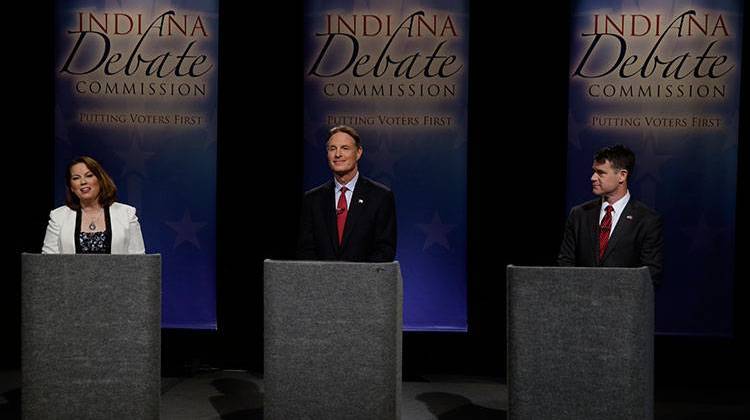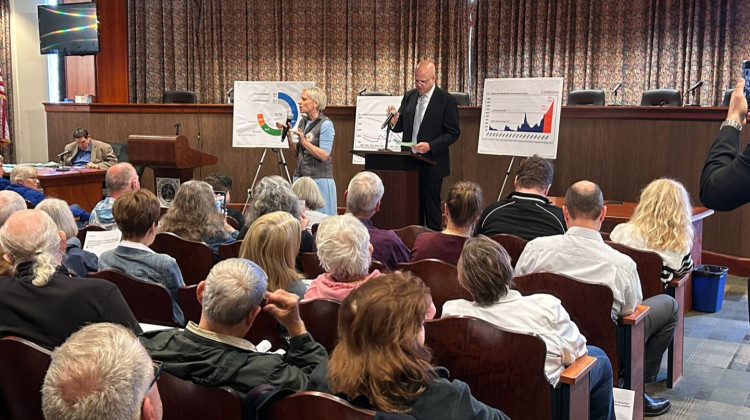
Libertarian Lucy Brenton, Democrat Evan Bayh and Republican Todd Young met in the WFYI studio Tuesday, Oct. 18 for their only scheduled debate for Indiana's open U.S. Senate seat.
AP photoIf you’ve watched TV or listened to the radio in Indiana the last few months, you’ve probably heard something like this: "Bailout Bayh: a sellout, not a senator."
And this: "Congressman Todd Young will hurt our families."
Indiana University - Purdue University Indianapolis political scientist Aaron Dusso says there’s a reason there are so many of those ads: conventional wisdom in political campaigns is that negative ads help depress turnout for one’s opponent.
“There actually is some support for this in political science research that suggests … I mean, some of the earliest work on effects of negative advertising were about its ability to turn people off,” Dusso says.
And Dusso adds that, beyond its effect on turnout, negative advertising also creates better-informed voters.
“Gaining knowledge of a person’s voting record is good, no matter if it comes with shadowy, scary music or not,” he says.
And that speaks to the defense candidates use when asked about their negative ads, such as in the case of Republican Senate candidate Todd Young.
“I don’t feel as though there’s a real problem shining a bright light on one’s opponent’s record, assuming that those bright lights are shining on pure facts,” says Young.
Of course, Young expresses “disappointment” that his chief opponent, Democrat Evan Bayh, went on the attack against him. Bayh said the same thing about Young, including when speaking to the press after this fall’s only senate debate.
“I think it’s unfortunate that Congressman Young was so just unrelentingly negative,” Bayh said. “Frankly, I think the people of Indiana have had enough of that kind of thing and enough of the attack ads.”
Bayh said about two minutes later after that: “[Young] seemed like he was kind of losing it there at the end, jabbing his finger at me and all that kind of thing.”
The debate was largely an extension of the negative ad war, with Bayh and Young trading shots at each other – something Bayh, post-debate, defended.
“Well I do think I have the right to defend myself,” he said.
The Bayh campaign did not respond to numerous requests from Indiana Public Broadcasting to sit down for an interview for this piece.
It’s within this climate that Libertarian candidate Lucy Brenton hopes she can capitalize.
“It allows me to be the only adult in the room. It allows me to be the only that’s running on what are the issues,” Brenton says.
Brenton says the chief issue is improving Indiana’s economy, which she believes is best done by legalizing hemp.
Of course it’s not just Bayh and Young themselves creating the negative tone. Tens of millions of dollars have been spent by outside groups, chiefly the national Republican and Democratic Senate campaign committees.
Conservative group Americans for Prosperity is also one of those outside groups – though AFP’s Indiana director Justin Stevens is careful to note that you won’t hear or see them on the airwaves. Rather, he says his organization uses a combination of phone calls and mailers to promote their message.
“We have not come out in support of Todd Young,” Stevens says. “We are opposing the policies of Evan Bayh. And we’re not targeting him because he’s a Democrat; we’re not targeting him because he’s a Republican. We’re targeting him because we don’t believe in the policies that he believes in.”
Young says Hoosiers aren’t necessarily well served by all the outside ads.
“There are instances where that bright light is shining on pure facts and in that instance, I think that’s fair. But where there’re distortions occurring, falsehoods being promulgated, I think that’s really troubling,” Young says.
But political scientist Dusso says outside groups can be impactful in a negative ad war between two candidates’ campaigns.
“When the campaign itself is the one that says, you know, ‘sponsored by this campaign,’ they also seem to have a backlash,” Dusso says. “And this is diminished by having organizations that aren’t officially associated with the campaign do it.”
Ultimately, though, Dusso says the campaigns must have balance – going negative can work, he says, only if the candidates then offer a positive message too. Whether it’s Young or Bayh who does the better job of that that could determine who emerges from this bruising contest the winner.
 DONATE
DONATE





 View More Articles
View More Articles



 Support WFYI. We can't do it without you.
Support WFYI. We can't do it without you.